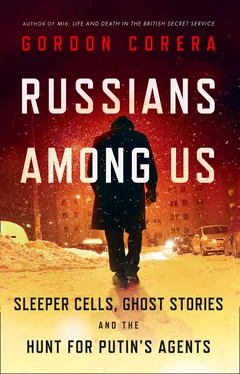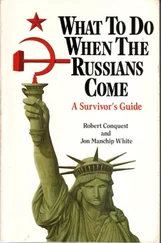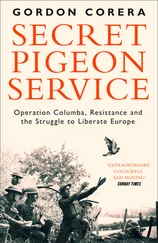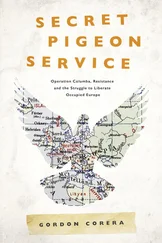As the coup collapsed, Bearden summoned one of his officers into his spacious office. Mike Sulick was a Bronx-born former marine who had served in Vietnam and had a PhD in Russian studies. He joined the CIA in 1980 and had already done one undercover tour in Moscow. He would eventually rise to be the head of the CIA’s clandestine service and a central figure in the intelligence war with Russia, one of the key players in the Vienna spy swap. Sulick that day had his bags packed to head off to Lithuania, one of the Baltic states that had sought independence from the USSR, in order to make contact with their intelligence service. “As I entered Bearden’s office, he eased back into his chair, propped his leather cowboy boots up on his oak desk, and broke the news: ‘Sorry, trip’s off, young man,’ ” Sulick later wrote. Then Bearden broke into a grin. “But look at it this way. It’s not every day the president puts you on hold,” he explained. The White House had delayed Sulick’s trip while they worked out whether or not to recognize the Baltic states. A few days later Sulick was allowed to travel to meet the Lithuanian spies. Once there, he walked around the local KGB office, a grand building that had been stormed while the coup had been taking place in Moscow. It was littered with documents half burnt and shredded by frantic KGB officers a few days earlier. A portrait of Dzerzhinsky had been slashed with a knife by the protesters who had forced their way in. Sulick went down into the grim, dark cellar in which prisoners had once been tortured in tiny cells. There was even a padded, soundproofed room for those sent mad by their punishment. “The empty cells still seemed faintly to echo the screams of tortured prisoners,” Sulick later remembered. He felt a tightness in his chest, an inability to breathe, and he could only stay inside for a few moments. This was the type of memory that stayed with those who battled against Russia in the spy wars and made them determined never to relent.
A few days later Bearden was in Moscow and sat across from the new, reformist head of the KGB. The KGB chief explained he wanted to end the Cold War mind-set. Too much effort and money had been wasted, for example, by putting listening devices into the new US embassy. Bearden slipped the US ambassador a note: “Ask him to give you the blueprints.” To the amazement of the Americans, the new KGB chief would soon hand over not just the plans but some of the actual transmitters that had been buried inside the American embassy being built in Moscow. Bearden took it as proof that his new ways of liaison might bear fruit. The KGB chief hoped the Americans would reciprocate with details of their bugging operations on Soviet missions in Washington and New York. He would be disappointed.
The handover of the plans by their new boss stunned the hardened operatives of the KGB. They thought it was madness. “How naïve to believe the fall of the Soviet Union meant foreign intelligence would no longer be needed,” thought one officer who had battled America. The KGB’s old guard, like those in the CIA’s Russia House, were not yet ready to give up the game even if their bosses were sitting down together. And their dicks were not quite in the dirt as much as it looked. One thing the KGB had not revealed was that even as their country fell apart, they had a pair of aces up their sleeve—two spies in the heart of American intelligence. But the reforms were too much for some. Shebarshin resigned soon after. “The Soviet Union is no more but eternal Russia remains. It is weakened and disorganised but the spirit of the Russian people has not been broken,” he wrote.
By the end of that year, republics including the Baltics had their independence, Gorbachev was gone, and the Soviet Union was formally dissolved. And so was the KGB, broken up in early December, to reduce the concentration of power. The old First Chief Directorate—the sword—became the SVR, with the task of spying abroad. Even though his statue had been torn down outside, inside the Lubyanka, Dzerzhinsky’s picture was still up on the walls, and small statues stood in rooms and corridors like shrines. The domestic security arm of the KGB—the shield—would go through various names in the coming years before eventually becoming the FSB. The names changed and the organizations underwent a crisis of morale in the following years. But what was preserved among a small cadre of KGB officers was a mind-set—the one that Shebarshin had articulated in 1991, in which Russian nationalism supplanted communism and in which spies had a duty to preserve the state to protect the motherland. That would be passed on to a new generation and when Shebarshin, decades later and in ill health, shot himself in his Moscow apartment using his ceremonial pistol, he would be living in a country run by one of his former KGB officers.
The KGB was dead. But it would rise again as something else. Only a few people understood that less had changed than at first sight. They included the small group of Western spies operating in Moscow at the time of the coup. In August 1991, their respite from surveillance had not lasted long. Precisely three days after vanishing in the park on a Sunday afternoon, the young MI6 officer’s minders from the KGB were back on his tail as if nothing had happened. The game went on.
On December 26, 1991, a married couple sat in a hotel room in Buffalo. They watched on CNN as the flag of the Soviet Union was lowered for the last time and they wept. The pair, with a newborn son to look after, were far away from home. He used the name Donald Heathfield. She was Ann Foley. The trauma they had felt over the last few months as they watched their country collapse had to be buried deep down and internalized. Ann had developed a nasty skin inflammation. It baffled the doctors since it seemed stress-related in origin. And yet on the outside she gave off the impression of a young woman without a care in the world. The couple had to hide their reaction to events in Moscow because they were KGB sleepers living under deep cover in Canada, pretending to be Canadians. Their long-term target was the KGB’s “main adversary.” But now the regime they had served and sworn an oath to was gone, along with the KGB that had trained them. Some illegals would use this moment to disappear, discarding their true selves and melting into the West as their adopted selves. But this couple chose to continue with their mission. They told themselves that their country—Russia—still retained their loyalty. “For me, my country is more than just a government or a certain political arrangement. I was serving my country, my Motherland,” Ann says. But as they watched the ceremony dissolving the Soviet Union and cried, they felt alone. What was their future now?

DONALD HEATHFIELD, LIKE his wife, had been born in a cemetery, a ghost rising from the dead. A baby boy had been born on February 4, 1962, in Canada, the third of four children of Howard and Shirley. Six weeks later, on March 23, Shirley found little Donald lying still, a tiny arm sticking out of the side of his crib. Her child had died. Tracey Lee Ann Foley was born on September 14, 1962, in Montreal, the first child of Edward and Pauline Foley. Seven weeks old and just a few days after she had smiled at her mother for the first time, she developed a fever. Within hours, she died of meningitis. As with the Heathfields, the pain of the loss of a child so young never left the family.
But then a quarter of a century later, Heathfield and Foley were suddenly there again, brought back to life by Directorate S.
Читать дальше













